 W
W"Beautiful" is a song written by Carole King that was first released on her 1971 award-winning album Tapestry. It has also been covered by other artists, such as Barbra Streisand and Richard Marx, and included on several of King's live albums. It was also used as the title song of the 2014 Broadway musical Beautiful: The Carole King Musical.
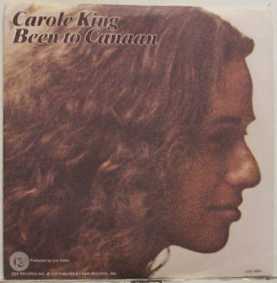 W
W"Been to Canaan" is a song written by Carole King introduced on King's 1972 album release Rhymes and Reasons. Released as that album's lead single, "Been to Canaan" peaked at #24 on the Billboard Hot 100 in January 1973 and it was the second of King's four #1 hits on the Easy Listening chart. The single also reached #20 on the Cashbox chart.
 W
WFantasy is an album by American singer-songwriter Carole King, released in 1973. At the time of its release, it only reached #6 on the Billboard album chart, but has remained highly regarded by her fans over the ensuing decades. Presented as a sort of song cycle, the album opens and closes with two versions of the title song and the songs on each side segue directly into one another.
 W
W"Breaking Up Is Hard to Do" is a song recorded by Neil Sedaka, and co-written by Sedaka and Howard Greenfield. Sedaka recorded this song twice, in 1962 and 1975, in two significantly different arrangements, and it is considered to be his signature song. Between 1970 and 1975, it was a top-40 hit three separate times for three separate artists: Lenny Welch, The Partridge Family and Sedaka's second version.
 W
WWriter is the debut studio album by Carole King and was released in 1970. King already had a successful career as a songwriter, and been a part of The City, a short-lived group she formed after moving to Los Angeles in 1968. Tracks on the album include "Up on the Roof" which was a number 4 hit for the Drifters in 1962, and "Child of Mine", which has been recorded by Billy Joe Royal, among others. The album did not receive much attention upon its release, though it entered the chart following the success of King's next album, Tapestry, in 1971.
 W
WFantasy is an album by American singer-songwriter Carole King, released in 1973. At the time of its release, it only reached #6 on the Billboard album chart, but has remained highly regarded by her fans over the ensuing decades. Presented as a sort of song cycle, the album opens and closes with two versions of the title song and the songs on each side segue directly into one another.
 W
W"Goin' Back" is a song written by Gerry Goffin and Carole King in 1966. It describes the loss of innocence that comes with adulthood, along with an attempt, on the part of the singer, to recapture that youthful innocence. The song has been recorded by many artists, including Dusty Springfield, Goldie Zelkowitz, the Byrds, Elkie Brooks, Blerta, Ricky Ross, Marianne Faithfull, Bill Drummond, Nils Lofgren, Freddie Mercury, the Move, the New Seekers, the Pretenders, Diana Ross, Richard Thompson, Phil Collins, The Icicle Works and Bon Jovi, as well as by Carole King herself.
 W
WSimple Things is an album by American singer-songwriter Carole King, released in 1977. It is her first album on the Avatar / Capitol label.
 W
W"Hey Girl" is a song written and composed by Gerry Goffin and Carole King. It first became a popular Top ten hit on the Billboard Hot 100 in August, 1963 when recorded by Freddie Scott. Donny Osmond took the song back to the Billboard top ten chart with his remake in 1971. There have also been many other cover versions of this song, including a cover by Billy Joel in 1997.
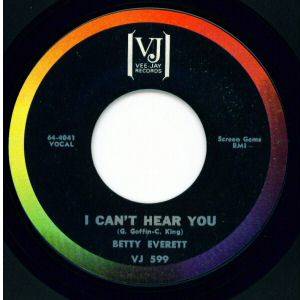 W
W"I Can't Hear You No More" is a composition written by Gerry Goffin and Carole King. It was originally recorded as "I Can't Hear You" in 1964 by Betty Everett. The most successful version was the 1976 Top 40 single by Helen Reddy.
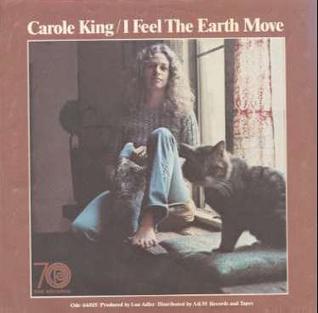 W
W"I Feel the Earth Move" is a song written and recorded by pop singer-songwriter Carole King, which first appeared on her album Tapestry. Additionally, the song is one half of the double A-sided single, the flip side of which was "It's Too Late". Together, both "I Feel the Earth Move" and "It's Too Late" became among the biggest mainstream pop hits of 1971.
 W
W"It Might as Well Rain Until September" is a 1962 song originally written for Bobby Vee by Carole King and Gerry Goffin. King recorded the demo version of the song and it became a hit for her. However, Vee's management baulked at releasing the song as a single, instead using it only as an album track. Bobby Vee recorded the song the same year for his 1963 Liberty album The Night Has a Thousand Eyes.
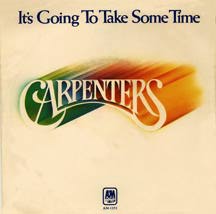 W
W"It's Going to Take Some Time" is a song written by Carole King and Toni Stern for King’s 1971 album, Music. It was redone by the Carpenters in 1972 for their fourth album, A Song for You. According to Richard Carpenter, he had to choose which songs he wanted to remake, and there was a big pile of 7-inch singles he had to listen to. When he encountered "It's Going to Take Some Time", he knew it would be a hit, and recorded it. The song peaked at number 12 on the Billboard Hot 100. Tim Weisberg played the bass flute, but the flute solo was played by Bob Messenger on a (standard) alto flute.
 W
W"It's Too Late" is a song from Carole King's 1971 album Tapestry. Toni Stern wrote the lyrics and King wrote the music. It was released as a single in April 1971 and reached number 1 on the Billboard Hot 100 and Adult Contemporary charts. Sales were later gold-certified by the RIAA. Billboard ranked "It's Too Late" and its fellow A-side, "I Feel the Earth Move", as the No. 3 record for 1971.
 W
W"Jazzman" is a 1974 song performed by Carole King, from her album Wrap Around Joy. King composed the music for the song, while David Palmer wrote the lyrics.
 W
W"The Loco-Motion" is a 1962 pop song written by American songwriters Gerry Goffin and Carole King. "The Loco-Motion" was originally written for Dee Dee Sharp, but Sharp turned the song down. The song is notable for appearing in the American Top 3 thrice, each time in a different decade: in 1962 by the American pop singer Little Eva ; in 1974 by the American band Grand Funk Railroad ; and finally in 1988 by the Australian singer Kylie Minogue.
 W
W"(You Make Me Feel Like) A Natural Woman" is a 1967 single released by American soul singer Aretha Franklin on the Atlantic label. The song was co-written by Carole King and Gerry Goffin, with input from Atlantic producer Jerry Wexler. Written for Franklin, the record was a big hit reaching number 8 on the Billboard Hot 100, and became one of her signature songs. It made history in the UK singles chart a week after her death, finally becoming a hit almost 51 years after it was first released entering at #79. Franklin also included a live recording on the album Aretha in Paris in 1968. Carole King has performed and recorded a version of the song along with Mary J. Blige, Celine Dion, and many others. At the 2015 Kennedy Center Honors, Aretha Franklin performed the song to honor award-recipient Carole King.
 W
W"Nightingale" is a song written by Carole King and David Palmer. "Nightingale" first appeared on her top-selling album Wrap Around Joy, which was released in mid-July 1974, but was released as a single in December. The song has since been put on many of her compilation albums, including her certified platinum album Her Greatest Hits: Songs of Long Ago.
 W
W"It Might as Well Rain Until September" is a 1962 song originally written for Bobby Vee by Carole King and Gerry Goffin. King recorded the demo version of the song and it became a hit for her. However, Vee's management baulked at releasing the song as a single, instead using it only as an album track. Bobby Vee recorded the song the same year for his 1963 Liberty album The Night Has a Thousand Eyes.
 W
W"Now and Forever" is a song written and recorded by Carole King for the major motion picture A League of Their Own. The song was written in 1992 solely by King and recorded the same year. The song became a hit on the US AC chart, and King received a Grammy Award nomination for it.
 W
W"Oh No Not My Baby" is a song written by Gerry Goffin and Carole King. The song's lyrics describe how friends and family repeatedly warn the singer about a partner's infidelities. The song is regarded as an American standard due to its long-time popularity with both music listeners and recording artists.
 W
W"Smackwater Jack" is a song written by Gerry Goffin and Carole King. It was first released on King's 1971 album Tapestry and then on the second single from that album, along with "So Far Away", charting at number 14 on the Billboard Hot 100. It was subsequently covered by many artists, most famously by Quincy Jones as the title song of his 1971 album Smackwater Jack.
 W
W“So Far Away” is a song written by Carole King, which appeared on her 1971 album Tapestry. The recording features James Taylor on acoustic guitar.
 W
W“Sweet Seasons” is a song written by Carole King and Toni Stern which appeared on King's 1971 album Music. It was the only charting single from the album, and was her second of four U.S. Top 10 hits.
 W
W"Up on the Roof" is a song written by Gerry Goffin and Carole King and recorded in 1962 by The Drifters. Released late that year, the disc became a major hit in early 1963, reaching number 5 on the U.S. pop singles chart and number 4 on the U.S. R&B singles chart. In the UK it was a top ten success for singer Kenny Lynch, whose version was also released in 1962.
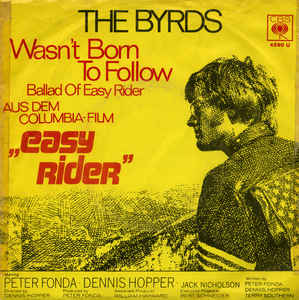 W
W"Wasn't Born to Follow", also known as "I Wasn't Born to Follow", is a song written by Gerry Goffin and Carole King. Goffin wrote the lyrics and King provided the music. The song was first recorded by the Byrds on their 1968 album, The Notorious Byrd Brothers. King's short lived band the City also recorded the song for their 1968 album, Now That Everything's Been Said. It has also been covered by many other artists, including the Monkees, the Lemon Pipers, Dusty Springfield, and as a solo recording by King. The Byrds recording was featured in the 1969 film Easy Rider and was released as a single in the UK and Germany in the same year as a result.
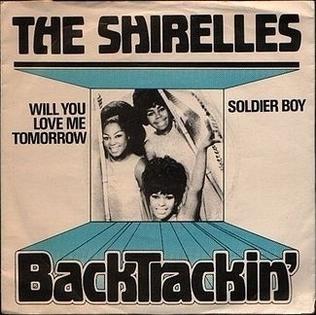 W
W"Will You Love Me Tomorrow", sometimes known as "Will You Still Love Me Tomorrow", is a song written by Gerry Goffin and Carole King. It was originally recorded in 1960 by the Shirelles, who took their single to number one on the Billboard Hot 100 chart. The song is also notable for being the first song by a black all-girl group to reach number one in the United States. It has since been recorded by many artists over the years, including a 1971 version by co-writer Carole King.
 W
W"You've Got a Friend" is a 1971 song written by Carole King. It was first recorded by King, and included in her album Tapestry. Another well-known version is by James Taylor from his album Mud Slide Slim and the Blue Horizon. His was released as a single in 1971 reaching number 1 on the Billboard Hot 100 and number 4 on the UK Singles Chart. The two versions were recorded simultaneously in 1971 with shared musicians.